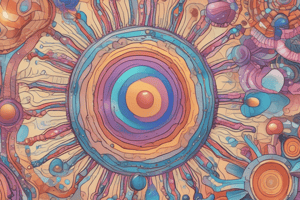Podcast
Questions and Answers
What is the primary focus of human physiology?
What is the primary focus of human physiology?
- Comparative analysis of cellular functions across species
- The structure of biomolecules in different organisms
- How organ systems maintain homeostasis in the human body (correct)
- The study of chemical reactions in plant cells
Which component is NOT part of a cell according to the content?
Which component is NOT part of a cell according to the content?
- Nucleus
- Cell wall (correct)
- Cytoplasm
- Cell membrane
What role do integral proteins play in the cell membrane?
What role do integral proteins play in the cell membrane?
- Contribute to the rigid structure of the membrane
- Act as enzymes for chemical reactions within the cytoplasm
- Serve as receptors for external signals
- Span the membrane and function as transporters (correct)
What is the composition of the cell membrane's lipid bilayer?
What is the composition of the cell membrane's lipid bilayer?
Which of the following statements about membrane proteins is true?
Which of the following statements about membrane proteins is true?
Flashcards are hidden until you start studying
Study Notes
Human Physiology: Introduction
- Physiology is the scientific study of how organisms function.
- Sub-disciplines include medical, animal, plant, cell, and comparative physiology.
- Human physiology focuses on maintaining homeostasis in the human body.
- It includes the study of nervous, endocrine, cardiovascular, respiratory, digestive, and urinary systems.
- Medical physiology explains the chemistry and physics of basic body functions.
Cell Physiology
- A cell consists of the cell membrane, nucleus, and cytoplasm.
- The cytoplasm contains organelles and a filament network.
Structure of the Cell Membrane
- The cell membrane encloses each cell, separating the intracellular and extracellular environments.
- It maintains cell integrity and regulates material passage.
- Composed of a lipid bilayer with cholesterol molecules.
- The lipid bilayer maintains membrane fluidity across temperatures.
- Membrane proteins include integral proteins that span the membrane and act as transporters.
- Other membrane proteins have various roles.
Studying That Suits You
Use AI to generate personalized quizzes and flashcards to suit your learning preferences.




